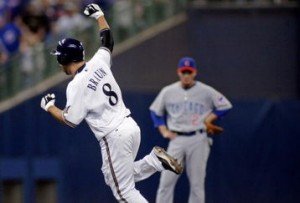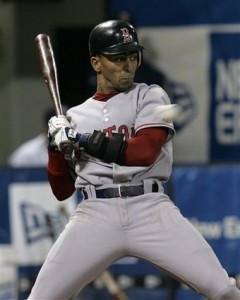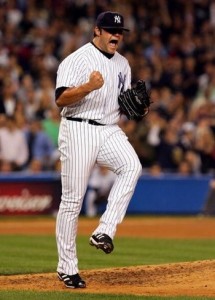By Jake McCormick
Ryan Braun walks with a swagger. Alfonso Soriano finishes his golf swing and smacks his helmet. Sammy Sosa did the hop. Manny Ramirez and Barry Bonds wait until the ball officially leaves the ballpark before taking their first steps towards first.
Joba Chamberlain and Carlos Zambrano fist pump and point to the sky after a third inning strikeout. Jose Valverde does a Tiger Woods twirl and pump after a first-out strikeout while walking around the mound like he owns it. Jonathan Papelbon and Francisco Rodriguez yelp and do squat thrusts after a 1-2-3 ninth against the bottom of the Royals’ order.
What’s the difference between the pitcher and hitter celebrations? The answer – nothing.
Football players dance in the endzone. Basketball players flex after dunks and three-point plays. Hockey and soccer players have collective orgies in the middle of the field or rink after a goal. So why are hitters considered cocky when they’re admiring home runs while pitchers are just getting excited?

But this issue itself is a vicious cycle. Every time Chamberlain fist pumps his third strikeout of the game, there will be an Aubrey Huff just waiting to blast a home run and fist pump right back. Every time Braun runs around the bases with his tongue hanging out or Soriano struts like he’s a consistent hitter, there will be a Jeff Karstens ready to remind them who is really in control.
There is one lost art of pitching that used to prevent this circle of life – the brushback pitch, which is a much better retaliation technique than actually hitting a batter. When I watch a game with my dad and someone takes their time going around the bases after hitting a home run to bring the team within four runs, he always reminds me that Bob Gibson would make sure there wouldn’t be a sequel by throwing the ball up and in, but not at the batter. Like a bell-ringing hit in football or a hard but legal pick in basketball, brushbacks serve as a way to prevent cockiness. Batters can hit all the home runs they want off Chamberlain or Papelbon, but they’ll still fist pump and celebrate a strikeout.

I’m really just in favor of consistency in a game that too often lacks it. Either it’s all OK, or none of it is. If hitters are going to be scrutinized for admiring a home run like it’s a work of art, pitchers like Zambrano and Valverde deserve the same treatment and criticism. I also think it would be a good idea for pitchers and hitters to take notes on fielder behavior after a big play.
Why don’t fielders do back flips or the Cupid Shuffle when they make a diving or game-saving catch? I’ve never seen a fielder rob a hitter and do an Irish jig, or seen the hitter give him the sit-and-spin with his middle finger. That’s because that fielder is doing his job and knows a diving catch or run-saving pick is a unique occurrence. Even the best fielders that are cocky hitters let their teammates dish out the props.
Emotions are a part of any sport, and watching a game without them will be boring, Plus they can pick a team up at the right time, much like Lou Piniella’s tirade a couple years ago. But as with all the other sports, keeping them in-check is just as important.
